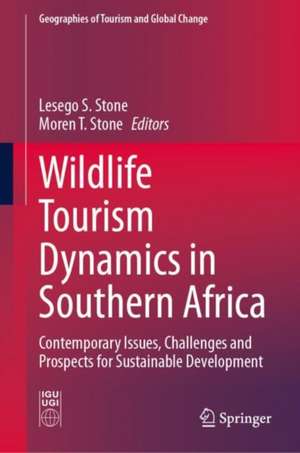Wildlife Tourism Dynamics in Southern Africa: Contemporary Issues, Challenges and Prospects for Sustainable Development: Geographies of Tourism and Global Change
Editat de Lesego S. Stone, Moren T. Stoneen Limba Engleză Hardback – 21 mai 2024
Preț: 952.09 lei
Preț vechi: 1161.08 lei
-18% Nou
Puncte Express: 1428
Preț estimativ în valută:
182.24€ • 198.02$ • 153.18£
182.24€ • 198.02$ • 153.18£
Carte disponibilă
Livrare economică 31 martie-14 aprilie
Preluare comenzi: 021 569.72.76
Specificații
ISBN-13: 9783031572517
ISBN-10: 3031572513
Pagini: 272
Ilustrații: XXI, 272 p. 12 illus., 8 illus. in color.
Dimensiuni: 155 x 235 mm
Greutate: 0.64 kg
Ediția:2024
Editura: Springer Nature Switzerland
Colecția Springer
Seria Geographies of Tourism and Global Change
Locul publicării:Cham, Switzerland
ISBN-10: 3031572513
Pagini: 272
Ilustrații: XXI, 272 p. 12 illus., 8 illus. in color.
Dimensiuni: 155 x 235 mm
Greutate: 0.64 kg
Ediția:2024
Editura: Springer Nature Switzerland
Colecția Springer
Seria Geographies of Tourism and Global Change
Locul publicării:Cham, Switzerland
Cuprins
Part 1: Introduction – An overview of wildlife tourism in Southern Africa.- Chapter 1. Wildlife tourism in southern Africa: Prospects for sustainability.- Part 2: Resource use opportunities, contests, and disputes.- Chapter 2. Wildlife tourism and human-wildlife conflicts.- Chapter 3. Cordon fences and wildlife tourism: Impacts on wildlife.- Chapter 4. Benefits and challenges of wildlife tourism in communal areas.- Chapter 5. Nature-based tourism in Zimbabwe: Sustainability issues.- Part III: The dynamics of tourism-based wildlife economies: Implications for sustainability.- Chapter 6. The state of wildlife tourism in the Southern African region: The case of SADC.- Chapter 7. The drivers and barriers of wildlife-based tourism: Cases from Southern Africa.- Chapter 8. Over reliance on wildlife tourism: Impacts and policy implications.- Chapter 9. Pursuing sustainable tourism development through wildlife tourism: Local resident’s perceptions.- Part IV: Hunting versus photographic tourism: Sustainability issues.- Chapter 10. Consumptive wildlife tourism in Southern Africa: implications for sustainability.- Chapter 11. Non consumptive wildlife tourism resources utilization dynamics.- Chapter 12. Contemporary issues affecting wildlife tourism: Crises and disasters.- Chapter 13. Indigenous communities and wildlife tourism: Issues of sustainability.- Part V: Protected areas and wildlife-based tourism.- Chapter 14. International laws and wildlife tourism in southern Africa.- Chapter 15. Transboundary resources and tourism.- Chapter 16. Protected areas and conservation conflicts: Impacts on sustainability.- Chapter 17. Joint venture partnerships and conservation in Southern Africa.- Part VI: Conclusion.- Chapter 18. Sustainable wildlife tourism in southern Africa: Concluding Remarks.
Notă biografică
Lesego Senyana Stone is an Associate Professor, Department of Tourism and Hospitality, University of Botswana, Botswana. Her research interests are in sustainable tourism development with specific reference to nature-based tourism, tourism marketing, community-based tourism, and community participation in tourism. Dr. Stone has published in several local, regional, and international journal. She teaches several tourism management courses.
Moren Tibabo Stone is an Associate Professor in Environmental Science and Tourism Studies at the University of Botswana, Department of Environmental Science. His research interests include sustainable tourism development and management, ecotourism, community-based tourism, protected areas conservation and community livelihoods improvement through tourism engagements.
Moren Tibabo Stone is an Associate Professor in Environmental Science and Tourism Studies at the University of Botswana, Department of Environmental Science. His research interests include sustainable tourism development and management, ecotourism, community-based tourism, protected areas conservation and community livelihoods improvement through tourism engagements.
Textul de pe ultima copertă
This book discusses opportunities, costs, and governance issues within the wildlife tourism space in Southern Africa. Wildlife tourism is a very important sector in Southern Africa. As such, the book discusses sustainable economic benefits local communities derive from wildlife tourism while also supporting wildlife conservation. It addresses several contemporary issues that have affected wildlife tourism, focusing on different countries in the region. These issues include international agreements such as CITES, the decline in wildlife species and reactions from the international community, human-wildlife conflicts and conflicts between states, indigenous communities living adjacent to protected areas hosting wildlife, and how to address these. As such, the book is a useful resource for researchers, tourism stakeholders, policy makers and students, especially those studying natural resource management, tourism and development and sustainable development in Southern Africa and other parts of the developing world.
Caracteristici
Discusses contemporary issues in wildlife tourism Useful resources for those in conservation, tourism and development Multi-disciplinary in nature with contribution from geographers, natural scientists and more










